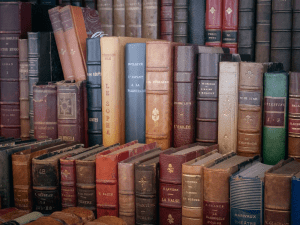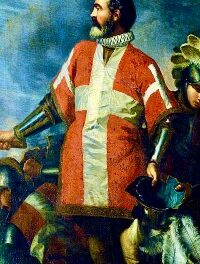We support our Publishers and Content Creators. You can view this story on their website by CLICKING HERE.
T.S. Eliot’s “The Journey of the Magi” is as sincere a conversion poem as one can have it: No fancy light shining down from the heavens or a thunderous call to holiness; just one small event that left a Magus perplexed by a new worldview that was unsettling and strange, for it put into question his previous passions and beliefs.
There is an idea that the best artists who have converted to Christianity sacrifice their creativity for spiritual relief. Regarding T.S. Eliot’s baptism and confirmation in the Anglican Church, Ezra Pound once remarked that he did not believe that Eliot had genuine “faith,” only that in his old age he had wanted to believe in something so badly that he did everything in accordance with religion to force it so. As Eliot’s poetry became more explicitly Christian and transcendent, his literary contemporaries grew divided over their feelings about the artistic quality of his poetry. It is certainly an interesting question: When the artist becomes admittedly Christian, he is now, presumably, starting to find solace over the many questions that remain unanswered regarding this difficult human experience. These are the very unanswered questions that we seek conversation about in art: For people, particularly non-religious, engaging with an artform in hopes of sensing similar questions about life, only to find that the artist resolves their frustration, sorrow, or anger, with Christ, may come off as too easy; a jump—or leap of faith—that the individual is not yet searching. It might even be a disappointment.
Eliot conveys that artistic middle ground that beckons faith without it emanating from his verses in a way that might put off new readers. In fact, I was always surprised to find within my English department an open love for Eliot’s poetry among faculty. Of course, they never mentioned neither his Christianity nor his conservative sympathies, hence why I came to his Christmas poems, which are about conversion, far too late, unfortunately. This is something I hope to rectify for readers who might not be familiar with his Yuletide reflections. The way that T.S. Eliot recorded his religious experience in his earlier Ariel poems, especially in “The Journey of the Magi” (1927), answers the question at the beginning of this essay regarding the “art” of the Christian artist. For the true artist, a genuine conversion to faith does not erase his experience as an artist, and here I mean artist in the broadest sense: as one who interprets the world through a unique sensory experience that allows him to create these experiences anew.
Art, after all, is the way we cope with the world. It is not faith whole, even if art does, in the best times, impart the undeniable need for Christianity without proselytizing. Art can either hand us a little piece of light that lingers in our minds or hearts for some time, or it can be completely devoid of joy or hope, leaving us empty and seeking something more. But this is only the opinion of someone for whom excessively devotional pieces miss the necessary mark of suffering that makes for the best art, be it musical, visual, or literary. The great canon of Western literature is, for the most part, an ongoing conversation that is agnostic at best about hope or salvation despite it being rooted in Christianity; herein lies the paradox about Western civilization that, I believe, has rendered it the legacy that it is. What we inherit is the quality of conversation through art and philosophy that allows us to doubt and to interpret pain and suffering in ways that turn out to be, no matter how hard we try to shake it, hopeful, and beautiful—as though God’s grace is never really gone from our efforts to create meaning and to understand the world.
These sentiments will be echoed, albeit in a better way, by Eliot’s verses. “The Journey of the Magi” opens with an admitting sense of frustration and exhaustion, even impatience:
A cold coming we had of it,
Just the worst time of the year
For a journey, and such a long journey:
The ways deep and the weather sharp,
The very dead of winter. (1-5)
Novel to the tone of this poem is how Eliot adopts the voice of one of the Magi who is narrating his memory of the arduous journey. Despite the holy topic the poem discusses, the Nativity, the Magus is speaking as if he were delivering a soliloquy: “Just the worst time of year,” the Magus is talking to us in an honest way, not hiding the tiresome elements of his travels, including the “cold” and “long” voyage with “sharp weather” in the “dead of winter.” He continues with his narration of the difficulties of the event:
And the camels galled, sorefooted, refractory,
Lying down in the melting snow.
There were times we regretted
The summer palaces on slopes, the terraces,
And the silken girls bringing sherbet. (6-10)
In his recollection, the Magus mentions how he and his fellow Magi, while witnessing their tired camels and contemplating the rigor of their mission, came to regret, or miss, their “summer palaces” and “silken girls” with “sherbet”—all the comforts and warmth of their home—for an unknown. All of these distractions had left them unprepared for their journey. The digression in the Magi’s memory continues on for the next couple of lines:
Then the camel men cursing and grumbling
and running away, and wanting their liquor and women,
And the night-fires going out, and the lack of shelters,
And the cities hostile and the towns unfriendly
And the villages dirty and charging high prices:
A hard time we had of it. (11-16)
The men who were caring for the camels are still caught up in their pleasures, “liquor and women.” Their fleeting desires make them spiritually weak, and so they are quick to quit and run away from their task. To make matters worse, the Magi’s fires are going out and there is nowhere for them to go. There is no shelter for them, as they pass through hostile cities with cold citizens. Such an inhospitable environment convinced the Magi to move onward:
At the end we preferred to travel all night,
Sleeping in snatches,
With the voices singing in our ears, saying
That this was all folly. (17-20)
There are moments when the Magi doubt their mission. The complications in their journey sparked hesitation, but, after so much turbulence, a sign:
Then at dawn we came down to a temperate valley,
Wet, below the snow line, smelling of vegetation;
With a running stream and a water-mill beating the darkness,
And three trees on the low sky,
And an old white horse galloped away in the meadow. (21-25)
The landscape has changed into a temperate one, almost as if the Magi themselves changed locations from one moment to the next. Alternately, it can also be the disposition and attitude of the Magi that facilitated this difference, probably in perspective. The following lines describe events that will come to Christ later in his life, as though the Magi are having visions related to His future.
Then we came to a tavern with vine-leaves over the lintel,
Six hands at an open door dicing for pieces of silver,
And feet kicking the empty wine-skins.
But there was no information, and so we continued
And arriving at evening, not a moment too soon
Finding the place; it was (you might say) satisfactory. (21-31)
The final line of this section (31) reaffirms the “personality,” as I like to call it, of the Magus who is narrating his story. In the beginning he was speaking to us in a frank way: Sure, he is telling us the story of the Birth of Christ, yet he doesn’t speak in hyperbole or excessive praise. He is direct about the overall difficulty of their journey and the un-impressiveness of what they found at the end of their travels. The Magus summarizes what should be the magnificent moment of meeting his Lord by simply saying that they found the place. And that it was “satisfactory,” you might say—satisfactory is stretching it, according to the Magus.
After a rather anticlimactic conclusion to their journey, the Magus adds a final personal reflection that is the most important part of the poem. He recognizes that, despite the troubles, he would repeat this task. Then, in his narrative tone and personality that we’ve gathered so far, he asks the reader to “set down,” or write something down. He repeats this multiple times: “but set down / This set down / this:” It’s as though the Magus, who we know is much older now since he is remembering his journey, is also trying to understand what happened to him and the other Magi that night by asking us to write something down because it is important—a thought that came only after reflection of the Nativity that continues to haunt him:
All this was a long time ago, I remember,
And I would do it again, but set down
This set down
This: were we led all that way for
Birth or Death? There was a Birth, certainly
We had evidence and no doubt. I had seen birth and death,
But had thought they were different; this Birth was
Hard and bitter agony for us, like Death, our death.
We returned to our places, these Kingdoms,
But no longer at ease here, in the old dispensation,
With an alien people clutching their gods.
I should be glad of another death. (32-44)
In the frankness of his old age, the Magus notes the incongruity of the long journey: “Were we led all that way for / Birth or Death?” The Magus almost sounds like he is complaining, but, more profoundly, he is expressing a question that he himself has not yet been able to answer. Of course, the Magus recalls that he saw a Birth. In fact, he adds, he had seen birth and death many times in his life, “But,” he confesses, “had thought they were different.” This statement signals that Christ’s Birth put this pseudo-logical impression about birth and death into question. The Lord’s birth was a “Hard and bitter agony” that, for some reason, the Magus interprets as Death—“our death.” The Magus recognizes the importance of the act that he witnessed, but cannot help but think that there is something bittersweet about Christ’s birth, for with it came a death: the way of life as the Magi had known before. After the simple moment for which they traveled so long, in a “satisfactory” place, something happened that shattered the Magi’s understanding of the world. They returned to their places: “these” Kingdoms, almost as though he wanted to say “these mere Kingdoms” (here I always envision a discontent old man with his arms spread out, gesturing at all that is around him that disappoints him).
The Magus is “no longer at ease” in his Kingdom, in that “old dispensation” which is the same way of life that he came to regret when he was first making the journey to Christ. That which he missed and believed constituted a rich life—women, food, palaces—no longer satisfies him like before. Even the people that he used to govern are alien to him, since they continue to clutch to their old gods. Now we know that the Magus has undergone some form of conversion, perhaps similar to Eliot’s? Here, I want to go back to the original point of this essay regarding the art of the artist who undergoes religious conversion. No part of this poem is particularly praising Christ or describing the events in a magical way, as most Nativity poems do. “The Journey of the Magi” is as sincere a conversion poem as one can have it: No fancy light shining down from the heavens or a thunderous call to holiness; just one small event that left the Magus (and Eliot) perplexed by a new worldview that was unsettling and strange, for it put into question his previous passions and beliefs.
The unique touch Eliot puts into this poem, apart from making it indirectly about himself, is that he makes the Magi’s journey into the journey of the Christian convert who, after experiencing a life-changing moment, is forced to go back to his old life—never the same again. Thus, the cynical conclusion: “I should be glad of another death.” At this point we might wonder if he means true death, or birth. To be glad of another death could mean that the Magus believes that another death, perhaps his own or that of his kingdom, would erase this old world order for good so that he would no longer feel displaced in his own home. This interpretation of the poem is a common theme in many of Eliot’s poems that deals with the inevitable changing of the times.
Thus, Eliot at Yuletide does not leave as merry a message as we’d like, nor as holy or devout. Still, this oblique reverence that understands the meaning of salvation and Christ, but that cannot help but feel empathy for the earthly man, (and convey it so by identifying with him) is what makes Eliot a poet as much as a Christian. It goes without saying that there never needs to be a division or categorization of these two elements—artist or Christian—but poems like “The Journey of the Magi” demonstrate, quite clearly, that Eliot’s understanding of Christianity and his “genuine faith” as Ezra Pound questioned it, was far more complicated and problematic to his own mind.
In a later poem, “The Cultivation of Christmas Trees” (1954) Eliot conveyed his emotions towards Christianity and Christmas in a way that seems to come full-circle for me. He explained that Christmastime must be filled with wonder, “So that the reverence and the gaiety / May not be forgotten in later experience,” and lest “the piety of the convert / Which may be tainted with a self-conceit / Displeasing to God and disrespectful to children” dominate what should otherwise be a time to think about joys and memories. Eliot knew the convert all too well. As a result, it appears he developed a sensible faith that faced the inevitable fear that comes with recognizing God. He concluded this jolly poem with a more serious note: “The accumulated memories of annual emotion” that we ought to remember about Christmas may be “concentrated into a great joy,” but that joy “shall also be a great fear, as on the occasion / When fear came upon every soul.” The unrest that Eliot imparts on his readers through his Christmas verses is a mark of his complexity that refuses to preach a pretty and facile Christianity—our theology and our story is more painful than that. For the adult who knows life’s troubles (spiritual or whatever else), Eliot’s message is a more trying one at Christmastime: It leaves us, like him, like the Magus, in a “hard and bitter agony” that is good for the soul by compelling it to reflect on fear and death, so that we may better contemplate Birth. His Birth.
This essay was first published here in December 2019.
The Imaginative Conservative applies the principle of appreciation to the discussion of culture and politics—we approach dialogue with magnanimity rather than with mere civility. Will you help us remain a refreshing oasis in the increasingly contentious arena of modern discourse? Please consider donating now.
The featured image is “The Journey of the Three Kings” (1825) by Leopold Kupelwieser (1796-1862), and is in the public domain, courtesy of Wikimedia Commons.

 Conservative
Conservative  Search
Search Trending
Trending Current News
Current News 






